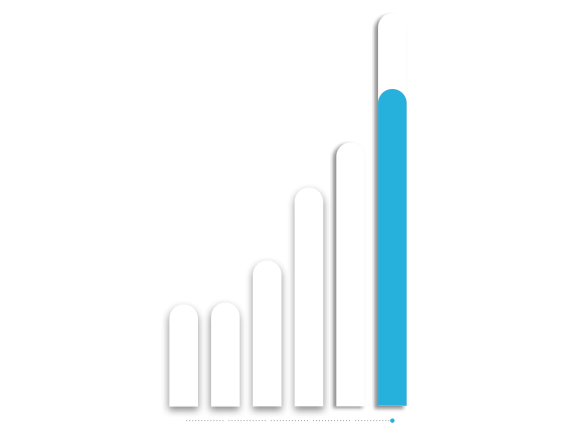In our core business, we focus on giving people peace of mind. We have our eyes on the future and plan to continue growing carefully, despite the challenging market environment.
We’ve set ourselves an ambitious goal: to become the best insurance company in Central and Eastern Europe in the long term. Our growth strategy UNIQA 2.0, which was developed in 2011 and implemented for a period of just under 10 years, is setting the course until 2020: We are concentrating exclusively on our core business and thus on our experience as a direct insurance company in our two core markets of Austria and CEE. This UNIQA 2.0 strategy is based on five pillars:
Set for growth – UNIQA 2.0 strategy
We are shaping the future
The UNIQA 2.0 growth strategy is accompanied by strategic initiatives in Austria and on a Group level.
More efficiency //
The introduction of a Target Operating Model (TOM) makes the UNIQA Group even more efficient. The objective is an overall standardisation of 80 per cent of the products and core processes.
More productivity //
Operational Excellence Programmes (OPEX) improve work processes, relieve employees and create potential for new tasks that increases productivity by about a quarter.
More synergies //
With the transition to three Service Centres in Austria, capacities in the back office have been focussed. Steps taken during restructuring:
- 1,132 employee appraisal meetings
- 180 new hires
- Over 80 workshops
- 68 partial implementation steps
1) Double our customer count
Our success as a service enterprise depends on the trust of our customers, which we intend to earn on a daily basis. Therefore, the overriding objective of UNIQA 2.0 is to double the number of our customers – from 7.5 million in 2010 to 15 million by 2020. In 2014, the UNIQA Group added 0.7 million customers for a total of 10.0 million (in 2013, we added 0.6 million to reach 9.3 million). However, due to challenging structural conditions, economic growth slowed down in some of our core markets, in particular in Eastern Europe. Therefore, we are still anticipating steady customer growth, albeit at a more moderate pace than in the past three years.
2) Concentrate on core business
In order to be able to offer our customers first-class service, we intend to focus on our core business as a direct insurance company in Austria and CEE. We are therefore gradually extricating ourselves from equity investments that do not support the core business. With our modified investment strategy, we are also lowering our share of real estate in light of Solvency II down to around seven per cent from around ten per cent at current market values, which is relatively high in international comparison. In addition, the limited sale of real estate eases the pressure on equity as a percentage of assets, because in accordance with Solvency II we have to back up real estate with greater capital resources.
3) Implement the priority programmes
We want to improve our core business in a sustainable way. To do this, we have further pursued our four priority programmes:
a. UNIQA Austria: increase profitability
We are optimising assumption guidelines, structures and processes to increase the profitability of UNIQA Österreich Versicherungen AG. One example is the consolidation of Back Office functions into three centralised service centres at five locations. We pressed ahead with the bundling based on business lines, for example the Property and Life lines, in 2014. At the same time, we increased the number of offices to approximately 420 and further reduced administrative costs: in 2014, the UNIQA Austria segment saved a total of over €20 million, or 14 per cent, of its costs.
b. Raiffeisen Versicherung Austria: increase productivity
Raiffeisen Versicherung AG operates solely in the bank assurance segment and works exclusively for the Raiffeisen Banking Group on the basis of a cooperation agreement entered into for the first time in 2013 for a period of five years. It offers its products in a clear B2B business model exclusively over this banking network, which is by far the largest in Austria. Raiffeisen Versicherung AG’s objective is to grow profitably beyond the market and thereby gain additional market share. They managed to do so in all segments based on the results for 2014 and in comparison to forecasts by the Austrian Association of Insurance Companies. Premiums rose by 3.1 per cent. Productivity in sales increased to 2.21 products per month and bank employee (2013: 2 products per month). This can be attributed to products that are more closely tailored for bank sales as well as targeted sales support, training and further education. Defined Service Level Agreements and quality standards in processing also helped. These are documented by monitoring and further developed on an ongoing basis by means of process optimisation.
c. UNIQA International: grow profitably
UNIQA International includes all of the subsidiaries outside of Austria. The goal in particular is to grow organically and profitably in the existing CEE markets as well as in Italy, Switzerland and Liechtenstein. In 2014, however, numerous factors curbed growth: weaker market growth in many countries in the region, the geopolitical conflict in Ukraine, negative currency effects and restructuring of the motor vehicle line in a few markets. Acquisitions in Eastern Europe are planned as part of our strategy; consequently, they will be carried out solely in existing markets and follow strict profitability objectives: In March 2014, we therefore completed our acquisition of the Baloise subsidiaries in Croatia and Serbia, which strengthened our market position in the Balkans (SEE region). The “Target Operating Model” (TOM) started in Southeastern Europe is being expanded gradually to the UNIQA Group. This enables us to harness cross-border synergies, improve our cost position, and expand customer service.
By standardising our products and core processes, we want to become even more efficient and create the foundation for developing uniform IT systems. Our aim is for at least 80 per cent of our processes to run on a standardised basis. In 2014, we started preparations for selecting a new core IT system for the UNIQA Group. We performed surveys in over 70 workshops, and we’ll take the next steps in the coming year.
d. Risk management: value-based management of risk
Solvency II will bring new oversight and equity requirements to European insurance companies beginning 2016. The UNIQA Group welcomes this change in the regulatory environment. We have reduced risk positions in the balance sheet and are strictly following the asset-liability management approach introduced in 2012. This means that we are already fulfilling the more stringent capital requirements of Solvency II. Preparations for introduction into all areas of the Company proceeded in 2014: one priority was the final integration of the ORSA process into the existing business planning process and the refined capital management built on top of it. This process integration creates the foundation for the value-based management of the Group as a whole.
4) Strengthen equity
The Group’s total equity increased in the past financial year due to the increase in the revaluation reserve – driven by higher fair values in particular with respect to fixed interest securities – to a new high of €3,102.4 million. In the spring of 2014, we were the first Austrian insurance group to publish a Group Economic Capital Requirement Report. In this report, UNIQA publishes detailed supplements to the topic of economic solvency under Solvency II.
5) Improve profits
Profit/(loss) from ordinary activities rose in 2014 by 22.9 per cent to €377.9 million – despite challenging economic conditions and the impairment of Hypo Alpe-Adria bonds. The crucial factors included growth in premiums, lower administrative costs and a solid development of investment income. The second half of the year was dominated by the internal cost management programme, which will make itself felt in the 2015 results as well. The Group cost ratio fell further to 21.8 per cent (2013: 24.0 per cent). Administrative costs declined by 17.5 per cent or €77.2 million.
We had to adjust the UNIQA 2.0 target for 2015 that we were aiming for back in 2011 and affirmed in 2013 – profit from ordinary activities of “up to €550 million” – to account for the sharp decrease in interest rates and the strained economic environment. We are anticipating profit from ordinary activities to be between €425 and €450 million in 2015. This corresponds to a further double-digit percentage increase as compared to 2014.
Growth of profit through UNIQA 2.0
Growth in profit from ordinary activities (in € million)

1) Adjusted for one-time and special effects


